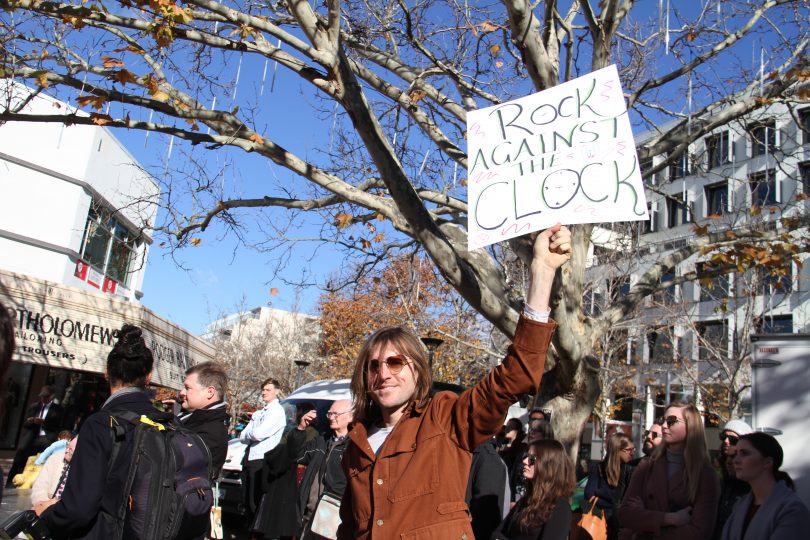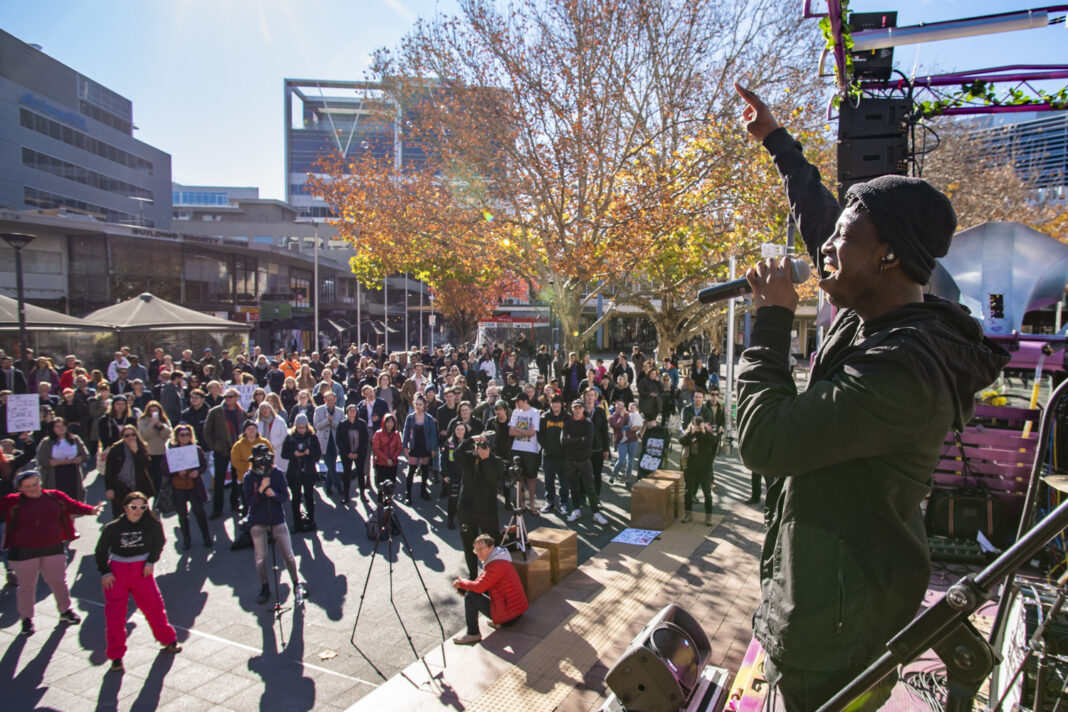Fed up with over 12 years of ACT Government inaction on reforming Canberra’s sound laws, peak body MusicACT have expressed their frustration over the lack of progress on October 2019’s Entertainment Action Plan.
The local music industry and hospitality sector have been repeatedly calling for reform following myriad reports and inquiries, as Canberra’s existing sound and planning laws have rendered the state of live entertainment in the ACT fragile.
After gathering over 700 people at Garema Place for a protest concert last year, 2020’s form of remonstration is a satirical video pointing out their issues with the existing legislature, and the lack of government action.
MusicACT president David Caffery said the sector’s concern has been widely documented since 2009.
“Politicians have asked the planning department to action its plethora of reports to co-locate residential buildings and vibrant uses, however night-time economy policy is inactive and new developments are being approved to inadvertently silence our city,” he said.
“The government hasn’t acted and now venues are really hurting, with no new ones opening. That leaves local and touring musicians with a bleak future in Canberra.
“We are calling on the government to engage experts to draft cohabitation and cultural activation policies for rapid implementation.”
Mr Caffery said prohibitive sound laws are compounded by development application approvals for residential buildings and hotels in Canberra’s CBD, which position existing live entertainment venues precariously.
“The approval of a hotel in Garema Place will have already repelled prospective music venue investors, and Covid-19 has further eroded confidence,” he said.
“Music venues cannot comply with EPA’s current requirements for mixed-use precincts, so approving a hotel means silencing the city.”
Canberra-based musician Kojo Ansah, AKA Citizen Kay, told Canberra Daily it is important live entertainment venues in Canberra’s CBD are protected to preserve and enrich our culture.
“Some people don’t fully understand, the amount of times people don’t realise or notice the acoustic guitarist playing covers in the corner … Just how much that plays into the vibrancy of the city,” he said.
“Without that there to help, especially coming out of this (pandemic), no one is going to want to go out, it’s going to kill that whole area, it’s going to kill Canberra to be honest.”
Mr Ansah expressed concern for the current, emerging and future performers of Canberra if the status quo is maintained.
“If it gets to a point where there’s limited opportunity to hone your craft … We’re going to have to go somewhere else or drive up to Sydney or fly to Melbourne every weekend,” he said.
“For future generations, if there’s nowhere for them to develop where are they meant to go? I know acts like Safia really honed their skills playing covers here in Canberra before moving on to play their own music.”

Canberra sound law limits ‘need to be increased’
One Canberra venue that has experienced the brunt of the Canberra’s sound laws is Braddon’s Hopscotch Bar.
Director of Hopscotch, Kate Parkinson, said the venue experienced a protracted four-year dispute following a sound complaint from a neighbouring venue.
Ultimately, in June 2019 a tribunal found in Ms Parkinson’s favour.
With Hopscotch having been open for six years come August, the only sound complaint the Lonsdale Street bar has received is from its neighbour.
Ms Parkinson told Canberra Daily while she was happy with the outcome, the process was arduous and costly for everyone involved.
“It isn’t a pleasant experience to end up in the court system, no one wins,” she said.
“If we’re all fighting about noise instead of focused on making our businesses the best they can be … we should be focusing on ways to highlight our city and not nit-picking about two decibels of sound,” she said.
Ms Parkinson called for the current sound laws to change, with the decibel level accepted in the inner-city nightlife precinct to rise from its current level of 50 or 60 decibels depending on the time of day.
“I think it’s important they increase the sound levels in the inner-city areas,” she said.
“Something like 50 decibels is a car driving past or a voice talking … I’m not saying we need to go up to 300 or something ridiculous, but they do need to be increased, particularly outside of those nine-to-five business hours,” she said.
“That’s what people come into the city for, live music … We don’t sell beer, we sell experience and entertainment, that’s what people come out for.
“You can have a beer at home.
“To keep our city as vibrant and exciting as it is, these cultural and hospitality venues that employ people … need to be able to showcase the musicians Canberra has here.”
Minister for Planning and Land Management Mick Gentleman told Canberra Daily in a statement that the ACT Government is “committed to delivering the (Entertainment Action) Plan and supporting the entertainment industry through the COVID-19 pandemic”.
“The ACT Government is implementing an Entertainment Action Plan to help attract and promote live entertainment in our City while striking the right balance with Canberra residents,” he said.
“Further engagement activities will take place as soon as it’s appropriate and will consider changes and challenges facing the nightlife and entertainment sectors in rebuilding from COVID-19.”
The Planning Minister pointed to amendments made to ACT noise regulations that came into effect in December 2019, which extended the daytime noise standards of 60dB across “land in the city centre or a town centre” until midnight on Friday and Saturday nights.



